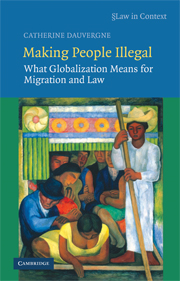Book contents
- Frontmatter
- Contents
- Acknowledgments
- Publication acknowledgments
- 1 Introduction
- 2 On being illegal
- 3 Migration in the globalization script
- 4 Making asylum illegal
- 5 Trafficking in hegemony
- 6 The less brave new world
- 7 Citizenship unhinged
- 8 Myths and Giants: The influence of the European Union and the United States
- 9 Sovereignty and the rule of law in global times
- Bibliography
- Index
- The Law in Context Series
- References
5 - Trafficking in hegemony
Published online by Cambridge University Press: 05 June 2012
- Frontmatter
- Contents
- Acknowledgments
- Publication acknowledgments
- 1 Introduction
- 2 On being illegal
- 3 Migration in the globalization script
- 4 Making asylum illegal
- 5 Trafficking in hegemony
- 6 The less brave new world
- 7 Citizenship unhinged
- 8 Myths and Giants: The influence of the European Union and the United States
- 9 Sovereignty and the rule of law in global times
- Bibliography
- Index
- The Law in Context Series
- References
Summary
The phenomenon of human trafficking stands out as the starkest example of illegal border crossing. Illegal migration with a difference – trafficking has “victims.” As victims, those who are trafficked fit differently into the imagination than many of those who are rendered illegal by the migration laws of prosperous nations. The label “illegal” will hardly stick, as the victims are innocent. This makes it more difficult for states to rhetorically cast the victims of trafficking as transgressors, thus altering the familiar illegal migration discourse. It is even problematic to equate the victims of human trafficking with those who suffer from the trafficking of drugs. Drug addicts are discursively more blameworthy than human trafficking victims are; they somehow are associated with some initial choice, a lack of willpower, or at the very least, a deep weakness. Trafficked humans have none of these markers. Although people trafficked are not only women and children, they are overwhelmingly so. In addition, while they do not exclusively serve the sex trade of the prosperous, sex work and sexual exploitation predominate as explanations for the success, in market terms, of trafficking in human beings.
The importance of human trafficking to globalized migration laws is all about victims: what it means to be a victim, how victims are constructed and named, how victims shape criminals, and how victims call forth remedy, or lack the power to do so. More than refugees, the victims of trafficking trouble the insider-outsider dichotomy of migration law.
- Type
- Chapter
- Information
- Making People IllegalWhat Globalization Means for Migration and Law, pp. 69 - 92Publisher: Cambridge University PressPrint publication year: 2008



